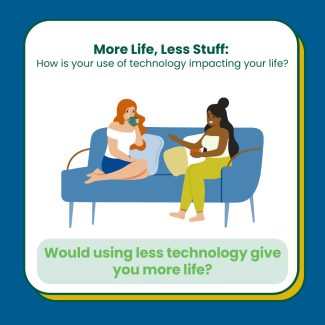By Crystal Zanders, More Life, Less Stuff Freelance Writer
I spent most of 2024 stressed out — it felt like one thing after another. Luckily, everything has worked out, but dealing with it gave me a new perspective on stress.
There are a lot of things in life we have no control over. When bad things happen, we choose how we are going to respond. I have learned to identify the energy-wasters in my life and to do what I can to declutter my mind so that after I deal with the real problems, I have more space and energy to live my life and experience joy. More joyful life, Less joyless stuff.
While reading online forums about having less stuff, I learned about digital decluttering, a relatively new concept. I realized that much of the time I spend using technology is ‘energy-wasting’ instead of ‘joy-bringing.’ So, I am starting my decluttering process there.

To be clear, I am not anti-technology. There are some ways that it helps us create a better, more enriching, more fulfilled life. I work remotely and live far from many of my friends and family. I am very grateful for current technology because not only does it enable folks with disabilities to live fuller lives, but it also allows us to connect with each other. However, it can also distract and disrupt life.
This isn’t about judging folks or myself for using technology but about making sure the technology is bringing life, not just more stuff.
So, how do we optimize the use of technology to create more life? How can we be purposeful about when, where, and why we use it — so that we are using it, it isn't using us?

Ask yourself, how much time are you spending in digital spaces?
Before I could begin to declutter, I had to stop and take stock of how much time I was spending in digital spaces and what I was doing during that time. Luckily, my phone tracks that for me.
Due to health issues, I spent the holidays alone. So, I spent more time using technology. I want to make sure I am spending my unstructured time doing things that matter to me. For example, I spent almost eight hours on my phone on New Year's Day.
Four hours were spent on calls and texts to and from people I care about. For me, connecting with them was a good use of technology. However, it might not have been such a good idea if I had been surrounded by family and/or friends in person. So, be sure to consider the context.
I spent another hour on YouTube. Since I listen to news and documentaries on YouTube while walking my dogs, I consider that an hour well-spent. I was outside getting fresh air and exercise, a positive use of time and technology.
The last three hours of my screen time were split between an online game and social media. I see my online gaming as neutral. It helps me relax. Some people knit; I play merge games. Learn more about healthy gaming.
That week, in addition to my groceries, I bought some dog toys. I felt guilty because, in an attempt to buy less stuff, I gave my dogs last year’s toys for Christmas. When you put a dog toy away for a few months, then bring it back out, dogs treat it like a new toy. Now that I think about it, I wonder if my guilt came from me or from the daily emails that I get from the pet supply store. Was this my idea, or was it a result of the targeted ads that I see all the time on social media because I have purchased dog food online?
My relationship with social media is more complicated because some of my time there is associated with my work. I use Facebook to network with writers around the world; LinkedIn is where I connect with other academics; I do some of my research on Reddit.
On New Year's Day, however, I was just reading and watching random things. I spent time watching a video of a dog hopping through the snow over and over again. I read comments to see how "the internet" responded to the news of a reality TV star's imminent (and third?) divorce. Although I find all of this entertaining, looking at my digital use with a critical eye, I need to consider:
Am I on social media because I am afraid that I'll miss out on something? If I go to social media for entertainment, am I having fun? (Dog video, yes. Reality star, not really.)
A University of Michigan study found that the more time people spent on Facebook, the less happy they were. Social media can increase feelings of anxiety and depression, especially in children and teenagers. For young people, this problem has gotten so bad that the US surgeon general is calling for a warning label on social media platforms. More Life, Less Social Media.
In my years of working in education, I've learned that kids tend to emulate what you do, not what you say. So, our relationship with technology affects the children in our lives. We have to be careful that what’s supposed to entertain us isn't bringing us down instead.
If you aren't benefiting from the use of this technology, then it might be time to digitally declutter your life — set time limits, especially on social media and the news.
How is your use of technology impacting your life?
- What & who matters most to you in life?
- How much time are you spending on those things and with those people?
- Is your relationship to technology interfering with your relationships with people?
- Is the time you are spending with technology improving your life?
- Would using less technology give you more life?
- Are there things in your technology usage that aren't serving you or connecting you with what and who matters the most?
- When looking at entertainment, are you having fun?
Part 2: How can you set limits on time spent in digital spaces?
I remember being baffled by my first smartphone. It kept blinking different colors, and I had no idea what that meant. I remember the day after I got it, the alarm went off in church, three times. I panicked. The phone was on silent. (Apparently, that is not what ‘silent’ meant.) There was no off button, and the guy at the store had turned it on. I had no idea how to stop it.
When I figured out why it was blinking — notifications from various applications aimed at convincing me to spend money — I was baffled again. There is nothing urgent about selling me something. I don’t need to be reminded to buy more stuff every five minutes. These days, I find having a phone constantly begging for attention is distracting, disruptive, and disorienting.
So, I deleted almost all store and restaurant apps. If I want to buy something online, I go through the browser. For the remaining apps, I went to the notification settings and told almost all the apps no notifications. I get a notification when my phone rings, when I get a text message, or when food items arrive. That’s it.
I became very concerned with the permissions each app was asking for, especially social media apps. My life isn’t dramatic enough to have digital intrigue. I don’t have anything to hide; it is the principle of the thing. So, I went through settings for apps that remained and revoked permissions for almost everything. If I didn’t know exactly why they would need that information, I told them no. Regularly auditing app permissions isn’t just important for mental health – it can be important for your cybersecurity.
Have you ever noticed that companies sign you up for random email lists? Over the years I have also become more picky about which marketing emails or text messages I allow. I have a specific email account for folks trying to sell me stuff, and I regularly unsubscribe to things that I don’t want.
We can also choose to periodically look at what data we’re saving and delete old files we definitely don’t need. I have shared hundreds of pictures on my social profiles over the years that, frankly, I have never looked at again, don’t matter to me, and don’t need to still be online. Sam McCracken, a doctoral student at the University of Michigan, studies “digital hoarding” – the indefinite saving of accumulated files, assisted by social media and other technologies, beyond the point when they serve any real social purpose. According to him, platforms like Facebook keep you hooked by periodically showing you these old posts again. While photos of old friends and major milestones are things I consciously want to save, pictures of a cup of hot cocoa I drank in 2015 are probably no longer serving me.
Automating Digital Boundaries
I also created boundaries to encourage healthy communication standards. For example, I don’t get work emails on my phone, and I don’t respond to work emails over the weekend or on vacation. I don’t answer any emails after 8 p.m. or before 8 a.m. Digital media scholar Melissa Gregg says that “consciousness of the always-present potential for engaging with work is a new form of affective labor that must be constantly regulated.” Basically, if I take emails on my off time, I am never mentally off work. I love my job. However, I am not the kind of writer who covers breaking news. If it is an actual emergency, you want to call 911. Otherwise, we can handle it in the morning.
As an educator, I also think it is important to model healthy boundaries for students. If a student emails me at 2 a.m. and I respond immediately, that encourages that student to wait up for me the next time they have a middle-of-the-night question. If they know I am not going to answer until the morning, perhaps they will go to bed.
Speaking of going to bed, I have a digital bedtime set as well. Most of the folks who have my phone number don’t need access to me 24/7. Many, many studies have shown that electronic media is terrible for your sleep in just about every possible way. At 11 p.m., my phone goes on ‘do not disturb,’ and it stays that way until 7 a.m. the next morning. For me, these boundaries have been developed over several years as my life and technology have changed.
At the end of the day, these small changes make a big difference in my everyday life. This is what works for me. As you are deciding what works for you, consider the following:
- Who needs 24/7 access to you? Who doesn’t need that access?
- Which notifications are helpful? Which are just interruptions?
- Are the apps on your phone purposeful? Are there apps that you are not using or services that might be better accessed through a browser?
- For the apps that remain, what permissions do they have? What kind of data are they collecting?
- What data have your social profiles accumulated that you might not need? Do these unused files really need to be saved forever to help platforms draw you back in?
- Who is looking at you to model healthy digital boundaries? How do your decisions about technology affect the people around you?
